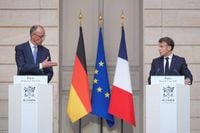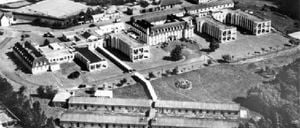Friedrich Merz has officially taken the helm as the new Chancellor of Germany, marking a significant shift in the country's political landscape. His election on May 6, 2025, was characterized by an unprecedented second round of voting in the Bundestag, a situation that has left many political observers questioning the stability of his leadership. Merz, who leads a coalition between the Christian Democratic Union (CDU) and the Social Democratic Party (SPD), is now tasked with restoring confidence among industrialists and reinvigorating the German economy.
On May 7, 2025, Merz embarked on his first official visit to Paris, where he met with French President Emmanuel Macron. The two leaders expressed a mutual desire to revive the Franco-German partnership, which has faced challenges in recent years. Macron emphasized the need for both nations to work together systematically to address the pressing challenges facing Europe, stating, "We will establish a Franco-German defense and security council that will meet regularly to provide operational responses to our common strategic challenges."
During their joint press conference, Merz acknowledged the importance of the Franco-German relationship, particularly in light of the geopolitical landscape shaped by the ongoing war in Ukraine and the rising influence of figures like Donald Trump. He described himself as a "very European Chancellor," indicating his commitment to strengthening Europe's independence from the United States.
Merz's election has not been without controversy. His victory, achieved through a difficult parliamentary process, has raised concerns about the political fragility of his coalition. French Europarliament member Valérie Hayer described the situation in Germany as a "political shock," while an anonymous French minister referred to it as an "absolute catastrophe." These sentiments reflect a broader anxiety among European allies about the stability of Germany's leadership.
In response to these challenges, Merz has pledged to focus on Europe for two-thirds of his first year in office. His agenda includes revitalizing the Franco-German relationship, enhancing ties with Poland, and addressing the security needs of the continent. He plans to visit Warsaw after his trip to Paris, where discussions will likely center on defense and economic competitiveness.
Merz's ambitious plans include a commitment to invest 500 billion euros in defense and infrastructure, alongside an additional 100 billion euros earmarked for climate protection. He aims to inject between 1,000 and 1,500 billion euros into the German economy over the next decade, with a gradual reduction in corporate tax beginning in 2028. The Federation of German Industries (BDI) has welcomed these initiatives but stresses the need for swift and rigorous implementation to ensure that growth potential is realized.
As Merz navigates his new role, he faces significant expectations from both domestic and international stakeholders. The German industrial sector, grappling with low investment and declining competitiveness, is looking for immediate and concrete measures from his government. A recent study by the Baden-Württemberg Bank (LBBW) revealed that only 22% of entrepreneurs plan to increase their investments this year, highlighting a climate of uncertainty.
Moreover, with the Polish presidential election approaching on May 18, 2025, Merz's relationship with Poland will be closely scrutinized. The nationalist Law and Justice Party (PiS) has been vocal about seeking reparations from Germany for damages incurred during World War II, a sensitive topic that could complicate diplomatic relations. Polish Prime Minister Donald Tusk, who is a staunch European supporter, must balance the need for cooperation with the historical grievances that linger in the background.
Despite these challenges, Merz's administration is poised to make significant strides in European leadership. Ursula von der Leyen, President of the European Commission, expressed her enthusiasm for working with Merz, stating that his experience as a former Europarliament member positions him well to contribute to a strong and competitive Europe. Meanwhile, Ukrainian President Volodymyr Zelensky views Merz's election as an opportunity to bolster Germany's influence on the international stage, particularly in the context of the ongoing conflict with Russia.
In a joint statement, Macron and Merz have underscored their commitment to addressing the strategic challenges facing Europe, including discussions on nuclear deterrence with Britain. Merz has indicated that this conversation is intended to complement existing partnerships with American allies within NATO.
As Merz prepares for his upcoming trip to Brussels on May 9, 2025, the expectations are high. The need for a strong and unified response to the challenges facing Europe has never been more critical. With the backdrop of a fragile political landscape and a pressing economic agenda, Merz's leadership will be tested as he seeks to navigate these complex waters.
In conclusion, Friedrich Merz's ascension to the Chancellorship represents both a challenge and an opportunity for Germany and its European partners. His commitment to revitalizing the Franco-German relationship, addressing security concerns, and fostering economic growth will be crucial in shaping the future of Europe. The coming months will reveal whether Merz can transform his ambitious plans into tangible results, particularly in a political environment marked by uncertainty and high expectations.





